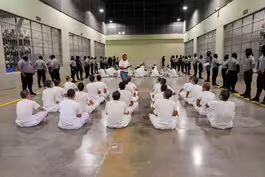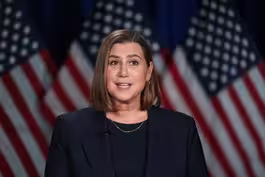
Economists offer views on Trump's tariffs and trade war
Clip: 4/30/2025 | 11m 41sVideo has Closed Captions
Economists offer differing views on Trump's tariffs and trade war
President Trump has made a bold gamble with a fundamental change in economic policy by launching tough tariffs. He argues they will revitalize manufacturing, reduce the national debt and grow the economy. Amna Nawaz has differing perspectives on Trump's claims from Oren Cass of the conservative think tank American Compass and economist Jason Furman, who served as an adviser under President Obama.
Problems playing video? | Closed Captioning Feedback
Problems playing video? | Closed Captioning Feedback
Major corporate funding for the PBS News Hour is provided by BDO, BNSF, Consumer Cellular, American Cruise Lines, and Raymond James. Funding for the PBS NewsHour Weekend is provided by...

Economists offer views on Trump's tariffs and trade war
Clip: 4/30/2025 | 11m 41sVideo has Closed Captions
President Trump has made a bold gamble with a fundamental change in economic policy by launching tough tariffs. He argues they will revitalize manufacturing, reduce the national debt and grow the economy. Amna Nawaz has differing perspectives on Trump's claims from Oren Cass of the conservative think tank American Compass and economist Jason Furman, who served as an adviser under President Obama.
Problems playing video? | Closed Captioning Feedback
How to Watch PBS News Hour
PBS News Hour is available to stream on pbs.org and the free PBS App, available on iPhone, Apple TV, Android TV, Android smartphones, Amazon Fire TV, Amazon Fire Tablet, Roku, Samsung Smart TV, and Vizio.
Providing Support for PBS.org
Learn Moreabout PBS online sponsorshipAMNA NAWAZ: One hundred days in, the president has made a bold gamble with a fundamental change in economic policy, launching a series of tough tariffs and trade wars.
The president argues that, in time, tariffs will revitalize manufacturing, reduce the national debt substantially, and grow the economy.
But there are many questions about that approach.
GDP numbers out today show the economy shrank last quarter and are being seen as yet another sign of the negative impact of tariffs.
We're going to get two distinct views about all of this, and we begin with Oren Cass.
He's founder and chief economist at the influential think tank American Compass.
He's also author of a new book called "The New Conservatives: Restoring America's Commitment to Family, Community, and Industry."
Oren Cass,welcome back to the "News Hour."
Thanks for joining us.
OREN CASS, American Compass: Thanks for having me.
AMNA NAWAZ: So let's start with that latest GDP number, which showed a contraction in the first quarter.
It's the first GDP pullback in three years.
There are some pointing out that the numbers are a little bit distorted because of big advanced purchases that were being placed before the tariffs hit.
But there's also real concern about a slowdown ahead.
So what's your view?
OREN CASS: Well, I think it's fair to be concerned, but it's also correct that the number that just came out doesn't indicate that one way or another.
There are all sorts of interesting nuances in how GDP gets calculated.
And, in this case, if you strip out the noise, it doesn't really look like an abnormal quarter at all.
So one way or another, I think we're still waiting and seeing on that.
AMNA NAWAZ: There have been some other indicators people have pointed to as signs of concern, though.
We saw consumer spending, yes, very strong in March, again, people thinking Americans are trying to get ahead of the tariffs.
In April, though, we did see consumer confidence drop for the fifth straight month.
It's now at COVID era lows.
We have a consumer-driven economy.
This is a crucial indicator for economic growth.
So does that confidence slump tell you there could be trouble ahead?
OREN CASS: It's certainly a possibility.
As you said, that slump is maybe five months running now.
And so whatever is going on isn't purely a result of the tariff policy.
But I do think it's fair to say that an important part of good economic policy isn't just the nuts and bolts and numbers.
It's also how clearly do you communicate what you're trying to do, how much certainty do you give.
And on those fronts, I think the Trump administration is -- they're trying to work in the right direction.
I think what they're focused on is exactly right.
But the amount of back-and-forth that there's been, the abruptness of it, I think, has definitely imposed a lot of extra costs.
AMNA NAWAZ: When you say it's imposed extra costs, do you mean that sort of air of uncertainty is making it difficult for CEOs, business leaders to plan ahead, make decisions at this time?
OREN CASS: Well, I think there's -- for business leaders and CEOs.
And, as you said, it is for consumers.
I think when you see a lot of things changing quickly in the economy, when you see a sense that risks are rising, when there's uncertainty, that affects everybody.
And so I think what the administration is doing in challenging the failed system of globalization is exactly right.
It's necessary.
It could be very good for America in the long run.
But we have to be cognizant that that brings disruption with it.
And so it's important to work extra hard to minimize that disruption and to communicate very clearly what's happening and why.
AMNA NAWAZ: So in terms of what consumers can face, I mean, the tariffs are so broad, I think it's fair to say that they will be felt by consumers in some way, depending on how much of the cost and which companies feel they can absorb some of them.
When you're speaking directly to consumers, what do you think that impact will be?
What will they feel?
OREN CASS: Well, I think it's important to emphasize that the kinds of price changes we're potentially looking at aren't anything like what we experienced with the inflation in the Biden administration.
Inflation then got up toward 10 percent economy-wide across all prices.
And the reality is that imports are just not a large enough share of what people consume to have that kind of effect.
And so I think we might see particular products, particularly if there are products that we're overly dependent on China for, where there are disruptions, where prices do increase.
But it's not the kind of inflationary situation that we saw previously.
And so what I think we have to focus on and also hope for is that, as we see some more consistency in the policy, as we hopefully see some things phased in a little bit more gradually, that gives businesses time to adjust.
That gives them a chance to find alternative sources of supply.
And so will there be some changes?
Yes.
But if the policy's done right, we can also see a lot more investment in making things in America.
And that's really important too.
AMNA NAWAZ: So if you don't see that kind of consistency, which we have not seen so far in the administration, does that raise your concern about a slowdown ahead?
OREN CASS: Well, I think the problem if we don't have consistency is two things.
One, it raises the costs in the short term.
It does create uncertainty.
And the other problem is, we don't get the benefit, right?
The whole reason to pursue this kind of policy is to really encourage more investment in the United States.
And businesses don't invest based on what the tariff is today.
They invest based on what the tariff is going to be in two years, three years, five years.
And so that's where, if we really want the plan to work, if we want to see the kind of rebuilding in America that we need, we have to have policies that are clear and consistent and everybody believes are going to remain in place.
AMNA NAWAZ: Or in the work of building plans, of luring back companies, of reshoring some of these jobs, that is yearslong work, right?
Do you see that happening?
Do you see the president and this administration sticking to this for the long haul?
OREN CASS: Well, the construction starts right away.
The building of factories has to happen and then you get some of the jobs in them.
I think what we can see that's really encouraging is what's happened with something like chips, right?
Over the last couple of years, Congress and the Biden administration and both Republicans and Democrats really focused on bringing chip manufacturing for computers back to this country, and that's working.
We're seeing hundreds of billions of dollars of investment.
We saw the construction jobs, and now we're seeing the permanent jobs as well, and the chips are starting to come off the assembly line.
AMNA NAWAZ: Oren Cass, founder and chief economist at American Compass, thank you so much for joining us.
OREN CASS: My pleasure.
Good to see you.
AMNA NAWAZ: Well, now we get the view of a leading economist who was the chair of the Council of Economic Advisers for President Obama.
Jason Furman is an economist at Harvard University and joins me now.
Jason, welcome back to the "News Hour."
Thanks for joining us.
JASON FURMAN, Former Chair, White House Council of Economic Advisers: Good to be with you.
AMNA NAWAZ: So, just want to get your take on this latest GDP figure we have out today, what it suggests about what's going on right now and what could be ahead.
JASON FURMAN: You know, I spent hours talking with my economist friends, and the ultimate conclusion is that it's looking in the past with a very, very confusing set of numbers, but, looking forward, there's a lot to be worried about.
AMNA NAWAZ: Tell me why.
What worries you most?
JASON FURMAN: What worries you most is, two bad things are happening simultaneously.
One is what an economist would call a supply shock.
That's like when the price of oil goes up and it drives up prices and it also increases unemployment.
That's what we're doing to ourselves through the tariffs.
Second, the way in which we're doing the tariffs has created so much uncertainty, so much doom and gloom, that it's what an economist would call a very large negative demand shock.
That's something that would add even more to the unemployment rate.
So at this point, when we look at the rest of this year, the debate is not, will inflation and unemployment go up?
It's, how much will they go up?
AMNA NAWAZ: You heard Oren Cass there say, look, this is a long-term plan that's been laid out by the president.
And he has said himself, the president, that there will be short-term pain.
But they argue here that it's worth doing because of the damage wrought by what they see as a failed globalization experiment, and that this is a chance worth taking to realign the global economy.
What do you say to that?
JASON FURMAN: First of all, things just weren't that terrible for months ago.
We had a 4 percent unemployment rate.
Real wages were rising.
The economy was growing strongly.
There was no reason that we needed to just blow all of that up.
Second of all, I don't think it's a plan because it's a constantly shifting set of impulses, and they change day to day.
Tariffs goes on, tariffs go off.
And the final thing I'd say is, in the long run, if what this results in is less exports and less imports, because when you have tariffs, you detach yourself from the global economy, that's bad for workers in export industries, bad for consumers who buy imports, which is all of us.
AMNA NAWAZ: I hear you saying it wasn't that bad a few months ago based on the indicators.
But if you could speak to the parts of the country who believe it's been very bad for a long time for them, who believe that the globalized economy wrought havoc on their communities, who saw jobs leave, and who think that this disruption is worth the risk if it means jobs and manufacturing or a potential change for them, what would you say to them?
JASON FURMAN: I'd say there's a lot of things we need to do to invest in America, to make America stronger.
One thing I agree with Oren is, for example, the chips program to make more microchips in the United States, I think that's a great thing to do for our national security.
But we don't want to cause a recession in the short run in order to have even worse jobs when we come out of it on the other end.
That's going to make things worse, not better.
AMNA NAWAZ: There's also a pledge by the president here that this will revitalize some parts of our manufacturing sectors.
I mean, clearly, we're not going to be making sneakers here at any point, but are there parts of our withered manufacturing sector that could be brought back to life by this program?
JASON FURMAN: You know, we want the best jobs for Americans, and, in general it's not government policy that's going to figure out what those best jobs are.
We want the ones with high wages, high productivity, and the like.
In some cases, for a national security reason, we do want to do things here.
So I'd love to do more microchips.
I'd love to make more drones in the United States.
There are parts of our industrial base that matter for our security.
But, in general, the best possible jobs for Americans are not necessarily going to be ones that the government picks and chooses and are not necessarily going to be manufacturing jobs.
AMNA NAWAZ: You know, in speaking with some CEOs and business leaders, they say that the uncertainty of the moment, it makes it tough.
They don't want a broad-based tariff approach, but they're not opposed to some targeted tariffs, that there are trade imbalances to address here.
Do they have a point?
JASON FURMAN: I don't think they have much of a point.
If we have trade imbalances -- we have a trade imbalance with Madagascar.
Why?
Because they make vanilla beans, they make cocoa beans.
We don't make those things in the United States.
And so we buy them from Madagascar.
And, by the way, they're a poor country.
They don't buy much from us.
So much of our trade imbalances are just like what we have right now with Madagascar.
China is an exception.
There are a set of both security and economic issues with China.
I'm not sure that a traditional laissez-faire approach is the right one vis-a-vis China.
But for just about the rest of the world, they have pretty low tariffs against the United States.
Until recently, we had low tariffs against them.
I don't think anyone was being unfair to us or taking advantage of us in any significant scale.
AMNA NAWAZ: All right, that is Jason Furman of Harvard University joining us tonight.
Thank you so much for your time.
JASON FURMAN: Thank you.
Alberto Gonzales on Trump’s willingness to test law's limits
Video has Closed Captions
Clip: 4/30/2025 | 6m 32s | Former AG Alberto Gonzales on the rule of law and Trump’s willingness to test its limits (6m 32s)
A look at the partnership between Vietnam and the U.S.
Video has Closed Captions
Clip: 4/30/2025 | 11m 32s | A look at the partnership between Vietnam and the U.S. 50 years after the fall of Saigon (11m 32s)
Sen. Slotkin says Democrats need to get 'Alpha energy'
Video has Closed Captions
Clip: 4/30/2025 | 7m 6s | Sen. Slotkin says Democrats need to get 'Alpha energy' and fight for middle class (7m 6s)
Supreme Court hears publicly-funded religious school case
Video has Closed Captions
Clip: 4/30/2025 | 7m 34s | Justices appear divided in Supreme Court case over publicly-funded religious schools (7m 34s)
Trump's Cabinet praises policies that have sparked pushback
Video has Closed Captions
Clip: 4/30/2025 | 4m 4s | Trump meets with Cabinet and praises policies that have sparked pushback (4m 4s)
Providing Support for PBS.org
Learn Moreabout PBS online sponsorship
- News and Public Affairs

FRONTLINE is investigative journalism that questions, explains and changes our world.

- News and Public Affairs

Amanpour and Company features conversations with leaders and decision makers.












Support for PBS provided by:
Major corporate funding for the PBS News Hour is provided by BDO, BNSF, Consumer Cellular, American Cruise Lines, and Raymond James. Funding for the PBS NewsHour Weekend is provided by...




